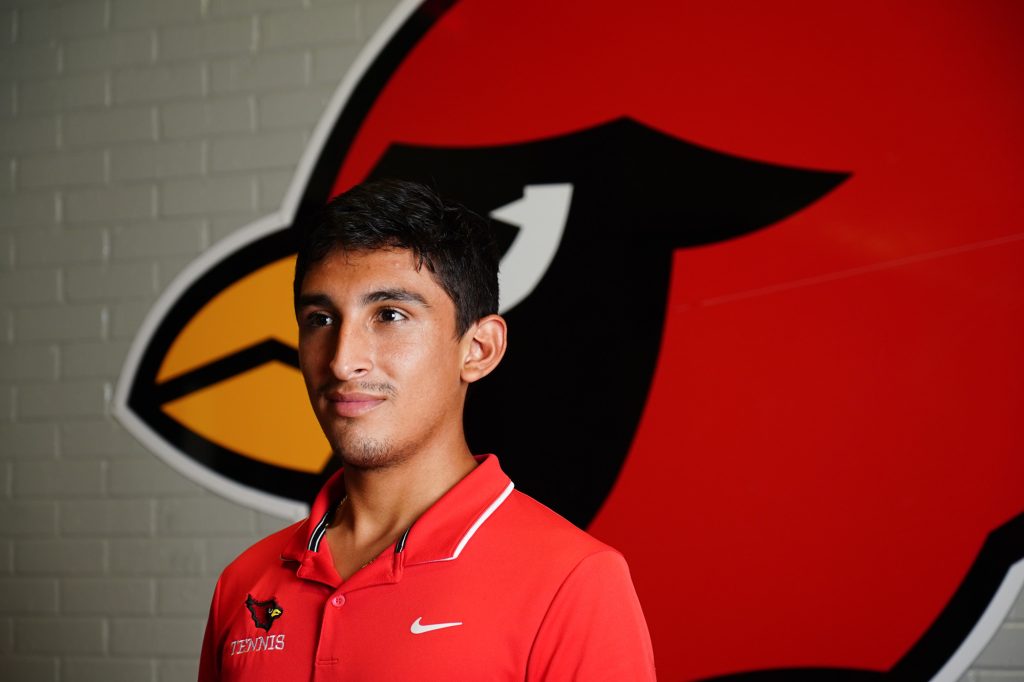HARLINGEN — It was a normal April day for then 9-year-old Anthony Garcia, a third-grader at Austin Elementary School in Harlingen, just a tickle in the back of his throat in the morning, but he pushed on to school.
After lunch, Garcia needed to be helped to the nurse’s office. Disorientation, blurred vision and vomiting overtook him. Garcia soon was sent to the emergency room.
Garcia was discharged a few days later but eventually returned to the hospital, where he spent the next few months fighting autoimmune encephalitis — resulting into medically induced comas to fight the disease.
Now a senior at Harlingen High, Garcia has recovered from the life-threatening disease and recently competed at the Region IV-6A tennis tournament in San Antonio, where he qualified as a District 32-6A champion in mixed doubles.
Autoimmune encephalitis is a medical condition in which the body’s immune system attacks the brain, causing inflammation of the brain and overall crippling brain function.
“My mom was the one that had to tell me what happened,” Garcia said. “She would tell me that I couldn’t eat, walk or talk. It was hard for me to do anything.”
Garcia does not remember much prior to the disease taking over his body either, he said. Just faint memories of his fight starting in late April 2013 at Driscoll’s Children Hospital in Corpus Christi.
Late May, the doctors diagnosed Garcia with encephalitis and began a treatment process centered around plasmapheresis — the removal of antibodies by removing blood plasma from the body, separating it to plasma and cells, and finally transfusing the cells back into the bloodstream.
Garcia was receiving this treatment while in a medically induced coma to prevent permanent brain damage from constant seizures.
“It was hard,” said Anthony’s father, Tony Juarez. “It is something you would not think of happening. You think, ‘Why does this happen.’ It was hard, very hard.”
Garcia was not recovering. Medicine removed from his blood during his plasmapheresis treatments resulted into a collapsed lung and a return to to a medically induced coma.
“No one thought he was going to make it,” said Anthony’s mother Isabel Garcia. “It is literally like the movies. They put you in a room, a doctor is sitting down and they sit you down. They explain to you that there is nothing else they can do for your child. Start thinking about options.”
Driscoll Children’s Hospital had not had an autoimmune encephalitis case before Garcia but had a doctor who had experienced it before: Dr. Ching Wang, a pediatric neurologist.
“He was our angel in disguise,” Isabel Garcia said. “He never gave up on him.”
Garcia was taken out of intensive care by the end of July, but another fight began.
Garcia only weighed 68 pounds after being discharged and could not walk, talk or eat. Outpatient therapy services were needed and had to come out of pocket until insurance was approved, and the service could not guarantee Garcia would be normal again.
“They had never seen a child like that before,” Isabel Garcia said. “They started with all these different therapies, and they pushed and we pushed.”
November is when Garcia reached for a bag of Doritos, the first time eating solid food in six months. In January 2014, Garcia went back to school, and in May of that year he was back to normal, but with an impact on his long-term memory.
“I try not to think about it,” Garcia said. “It makes me sad, just hearing what I went through, it is, like, wow, I went though that.”
Garcia was active in most sports before the disease, especially contact sports, but with the doctor saying no to contact sports because of the brain, Garcia and his family opted for tennis.
“It has been life-changing, playing tennis,” Garcia said.
By the time Garcia started playing tennis in high school, he had regained his athletic prowess from prior to falling ill. His vertical leap was the highest on the team, head coach James Tanamachi said. Lobbing over Garcia was not an easy shot.
“Because he was so athletic, I never had a clue about his prior medical condition until his mom told me this year,” Tanamachi said. “It is just amazing how far he has come back from it all.”
Tanamachi said Garcia was very coachable and that he felt bad for being hard on Garcia for stuff, but it worked out for the best. Garcia became a district champion and competed 10 years from the day, April 11, at the regional tournament in Austin.
“Thank Coach T, his assistant coach and his wife, helping and working with him to get to this point,” Juarez said. “He achieved something very big. All the work they did with him was amazing to see. I am very thankful for the coaches here.”
Garcia and his teammate, Ashlynn Burn, were eliminated at the regional tournament during the first round, but Garcia was happy just to be there, he said. Now that tennis is over, Garcia is preparing for graduation and planning to attend Texas State Technical College in Harlingen.

